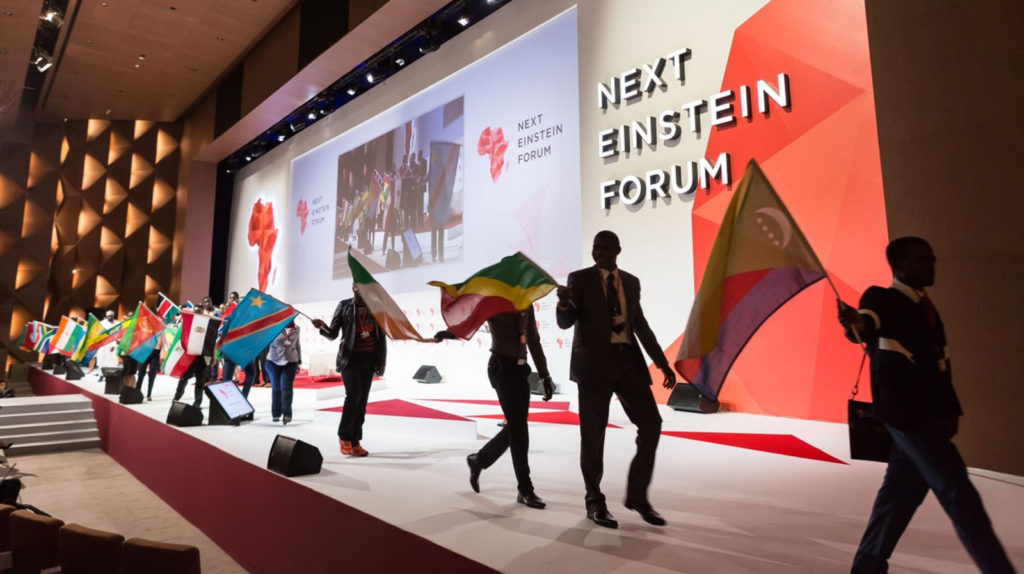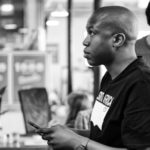We all have them. Those apps we open without thinking. Not because we need anything in particular, but because they feel… safe, in some…
Here are the finalists of the Next Einstein Forum’s Ci2i Innovation Competition

The Next Einstein Forum’s (NEF) in partnership with the Robert Bosch Stiftung has announced the top 16 finalists of the Ci2i Innovation Competition.
NEF — an initiative of the African Institute for Mathematical Sciences — made the announcement in a statement on Tuesday (20 March) noting that the winners will be announced on 28 March at the closing ceremony of NEF’s 2018 Global Gathering in Kigali, Rwanda.
The second edition of the competition will see the finalists — a mixture of scientists and entrepreneurs — compete across three categories, namely data science and deep tech, personalised health and climate smart innovations.
Thierry Zomahoun, president and CEO of AIMS as well as the founder and chair of the NEF, said the forum believes that scaleable science-driven inventions are crucial for Africa’s transformation.
The Next Einstein Forum Ci2i Innovation Competition winners will each receive $25 000
“The NEF Ci2i challenge rewards research based innovations and products that have a direct impact on our communities. The selected finalists’ innovations address climate change, various health challenges and push the envelope by proposing new data science or advanced (deep tech) technologies,” Zomahoun said.
“We look forward to seeing all their ideas come to life.”
The 16 finalists, who were selected from 133 applications, will pitch before a panel of judges in three to four minute pitches which will focus on impact and scalability.
The judges include executives from Johnson & Johnson, Elsevier, Rwanda Biomedical Center, Hello Tomorrow, Carnegie Mellon University, IBM Africa, and the African Development Bank among others.
Thereafter, the final two finalists in each category will present in plenary on 28 March, with the winner to be announced live at the closing ceremony of the NEF Global Gathering.
Winners in each category will receive $25 000.
Here are the finalists.
Climate smart innovations
Donatus Njoroge (Kenya)
Formulated from the essential oils of locally sourced plant species, Njoroge’s Molepse Bio resource oil and powder functions as a repellent and is also toxic to all major post-harvest pests.
The plant-derived bio-pesticide has enabled farmers reduce pest infestation and take control of health issues associated with synthetic pesticides.
Dickson Ayuka (Kenya)
Ayuka co-founded UjuziKilimo Solutions, a company that collects and analyses farm data using sensors, GPS, satellite and mini weather stations to help farmers and agricultural stakeholders make precise decisions.
Ayuka’s company has developed the UjuziKit, a GPS and internet enabled device with sensors. It is installed in farms to monitor the levels of nutrients, weather, soil PH and moisture content. This data is then used to direct water, lime and fertiliser nutrient application rates.
Isaac Brenya (Ghana)
Brenya’s startup Ecovon is developing sustainably sourced, newly-engineered wood made from coconut husk and sugar cane bagasse. The startup aims to supply the global market with a formaldehyde-free bio-based wood alternative that is better for people and the planet.
Rachel Sibande (Malawi)
Sibande established Malawi’s first innovation hub, mHub, in 2013. She now seeks to use maize cobs as a biofuel to run a gasifier based electrical system.
The system will provide affordable power to under-served communities, schools, health centers and local enterprises in Malawi where only less than 10% of the population are connected to the grid.
The ash and co-products from the power system are up-cycled to create Compressed Earth Blocks to build cheap houses among other methods for economic development and job creation.
Isaac Sesi (Ghana)
Sesi’s company, Sesi Technologies, manufactures affordable hardware and software technology for farmers and other stakeholders in the agriculture sector. Sesi’s latest innovation, GrainMate, helps grain farmers accurately measure the moisture content in their grain crops before storage.
By using GrainMate, grain farmers can tell the exact moisture content in their grains and know whether they are ready for storage or have to be dried some more. This helps reduce contamination of grains due to aflatoxins and other microorganisms which cause post-harvest losses in grains.
Lahbib Latrach (Morocco)
Latrach is the founder and CEO of Green WATECH. The company’s patented innovation (Multi-Soil-Layering technology) is a new low cost and efficient wastewater treatment method.
MSL technology is designed to be used to manage and reuse domestic wastewater in rural communities and decentralised sites. It consists of water filtration using available and low-cost materials such as soil, gravel and sawdust.
Deep tech solutions
Abdoulaye Diallo (Guineau)
Diallo is the co-founder of My Intelligent Machines (MIMs) which created MIMsOmic.
MIMsOmic is a software as a service platform that leverages artificial intelligence (AI), natural language and bioinformatic domain-specific workflows to help scientists and physicians working in academia, hospitals, health organisations, pharma, biotech and agri-food industries perform self-serve genomic research and biovigilance.
With AI managing natural language, biological knowledge and bioinformatic workflows in real-time, MIMsOmic empowers scientists and physicians by giving them real-time access to genomic-informed knowledge.
Davy Uwizera (Rwanda)
Uwizera is working on S-Transport, an artificial intelligence solution for public transport in African cities. The system uses cameras, sensors and GPS trackers on buses and at bus stops to collect data on the number of passengers onboard buses as well as those waiting at bus stops.
This data is then used by operators to monitor buses and passenger demand. Passengers in turn are able to access the data through SMS notifications and on information panels at bus stops.
Oday Samad (South Africa)
Samaad is currently working on the Sign Project, a tech-enabled life jacket.
Tobi Dwoeye (Nigeria)
Dwoeye is carrying out research using patient generated data to assess the effects of pain medication administered to pregnant women.
He is using mobile and web digital identities — in conjunction with machine learning to reveal hidden patterns, create situational awareness, positively affect clinical practice and produce undeniable evidence based results.
Magondu Wairimu (Kenya)
Wairimu is the project manager at eLimu. The company created a literacy app, Hadithi Hadithi, aimed at six to eight year olds with stories written in local languages from Kenya, Uganda, Somalia and South Sudan.
The app covers a curriculum which follows the scientifically proven Reading to Learn approach, with each story consisting of sentence making, spelling, and letter tracing games.
Personalised health
Conrad Tankou (Cameroon)
Medical doctor Tankou founded GIC Space, a social venture that developed GIC Med, a telemedical and digital microscopy project targeting breast and cervical cancers.
GIC Med provides women with breast and cervical cancer with access to screening and diagnosis by medical specialists. In addition the solution’s platform ensures treatment and follow up.
Joel Gasana (Rwanda)
Gasana is a final year medical student at the University of Rwanda, a social health entrepreneur and founder of the Companionapp.
The Companionapp is a mobile app that connects HIV positive patients with their doctors to increase the follow-up of patients and improve adherence to Antiretroviral medication (ART)
Emmanuel Owoebu (Nigeria)
Owoebu, a medical doctor, has created OMOMI, an app that employs behavior change modification, continuous learning and teaches DIY skills to tackle maternal and child mortality.
OMOMI enables mothers to monitor the growth and development of their children, access quality health information and medical expertise around the clock.
Muranyandzi Rushambwa (Zimbabwe)
Rushambwa is designing a system that allows doctors to retrieve real-time physiological information about patients from anywhere in the world.
The system, which leverages Internet of Things technology, enables physicians to give better assessments remotely. Rushambwa believes it will lower healthcare costs and increase healthcare service coverage in remote areas.
Daniel Nyabadza (Zimbabwe):
Nyabadza’s startup, Digitech, has developed an electronic handheld smart cane for the visually impaired.
The cane — which makes use of image recognition and other AI technologies provided by IBM Research (South Africa) — offers blind candidates more navigational freedom and contextual awareness of the environment.
Featured image: Next Einstein Forum via Twitter

